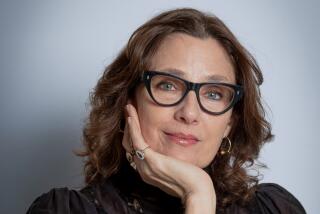Nobel winner’s daughter also a humanitarian
Rhena Schweitzer Miller, the only child of Nobel Prize-winning humanitarian Dr. Albert Schweitzer, who carried on his medical missionary work in the West African country of Gabon after his death in 1965, has died. She was 90.
Miller died of natural causes Sunday at her daughter’s home in Pacific Palisades, according to Dr. Lachlan Forrow, president of the Albert Schweitzer Fellowship.
Although Miller was not close to her famous father until the last years of his life, she embraced his “reverence for life” philosophy and helped organize the fellowship, which has supported the Albert Schweitzer Hospital in Lambarene, Gabon, for nearly 70 years. She ran the hospital from 1965 to 1970. She led a relief effort for Biafran refugee children during the Nigerian-Biafran War of the late 1960s.
Later, with her physician-husband, Dr. David Miller, she conducted healthcare projects in several underdeveloped countries.
“Rhena was an extraordinary woman in her own right, embodying fully her father’s ethic of reverence for life and his insistence that ‘my life is my argument,’ ” Forrow said.
Several years ago, Miller discovered a trove of correspondence between her parents, who spent most of their married life apart. “The Albert Schweitzer-Helene Bresslau Letters, 1902-1912,” published by Syracuse University Press in 2003 with an introduction by Miller, shed light on Schweitzer’s intellectual development and the influence of his wife, who founded a home for unwed mothers at the turn of the 20th century and later worked with him as his anesthesiologist in Lambarene.
Schweitzer was an Alsatian physician, theologian, musicologist and concert organist who with his wife established a hospital for lepers in Lambarene in 1913. Tormented by the misery he saw there, he developed a philosophy that stressed the unity and interdependence of all life and devoted the next 50 years to his medical missionary work. His achievements were honored with the 1952 Nobel Peace Prize.
Miller was born in Strasbourg, France, on Jan. 14, 1919, her father’s 44th birthday.
When she was about 6, her father returned to Gabon, but she remained in Europe with her mother, whose delicate health ruled out the challenges of living in equatorial Africa. She grew up, married and had children largely outside of her father’s presence.
Despite their separate lives, she absorbed his moral teachings about the sanctity of even the lowest forms of life. He would not allow her to pick wildflowers, for instance, and if they came across a worm stranded on a sidewalk, “he made me pick it up out of the sun and carry it back to the grass,” she recalled in an interview years ago.
Although she wanted to follow in his footsteps and become a doctor, he forbade her to study medicine, a decision that hurt her deeply, Forrow said. Schweitzer was temperamental and “not the saint some people made him out to be,” Miller told the Saturday Evening Post in 1994, “but he was an exceptional human being, I’m quite sure.”
In the late 1930s, she and her mother made two trips to the United States to raise funds for the Schweitzer Hospital and mobilize support for the Albert Schweitzer Fellowship. Founded in 1940, the nonprofit group has sent scores of graduate medical students to work in Lambarene as well as in underserved communities in the United States.
When her mother died in 1956, Miller wrote to her father suggesting a reunion on their birthday. He invited her to Lambarene and somewhat reluctantly agreed to let her become his lab technician. She studied in Zurich for two years and returned to Gabon in 1960 with her diploma. Soon after, he surprised her by making her the head of his laboratory.
Just before he died in 1965 at age 90, he surprised her again by asking her to run the hospital for him. “He didn’t even prepare her totally for it,” said Miller’s daughter, Dr. Christiane Engel, “but he had a big admiration for her and also realized that humanitarian work was the essence in her life.”
After the Nigerian-Biafran War broke out in 1967, Miller brought 80 Biafran children to Lambarene and took care of them until the war ended in 1970. She then took them back to Nigeria and was able to reunite many of them with relatives. She informally adopted one of the children and paid for his entire education, Engel said.
Miller had four children with her first husband, Jean Eckert, who built organs for Schweitzer. In addition to Engel, of Pacific Palisades, she is survived by Monique Egli and Philippe Eckert of Switzerland and Catherine Eckert of Italy; eight grandchildren and five great-grandchildren.
After her divorce from Eckert, she married Dr. David Miller in 1970. A researcher for what was then the U.S. Center for Disease Control and chief medical advisor to the Nigerian Red Cross, he worked with her through the 1970s on nutrition studies in India, Bangladesh, South Vietnam, Ethiopia, Egypt and Haiti. Between 1979 and 1985 they led healthcare projects in Yemen and Pakistan. He died in 1997.
Miller’s ashes will be buried next to her parents’ graves in Lambarene.
--
More to Read
Sign up for Essential California
The most important California stories and recommendations in your inbox every morning.
You may occasionally receive promotional content from the Los Angeles Times.











